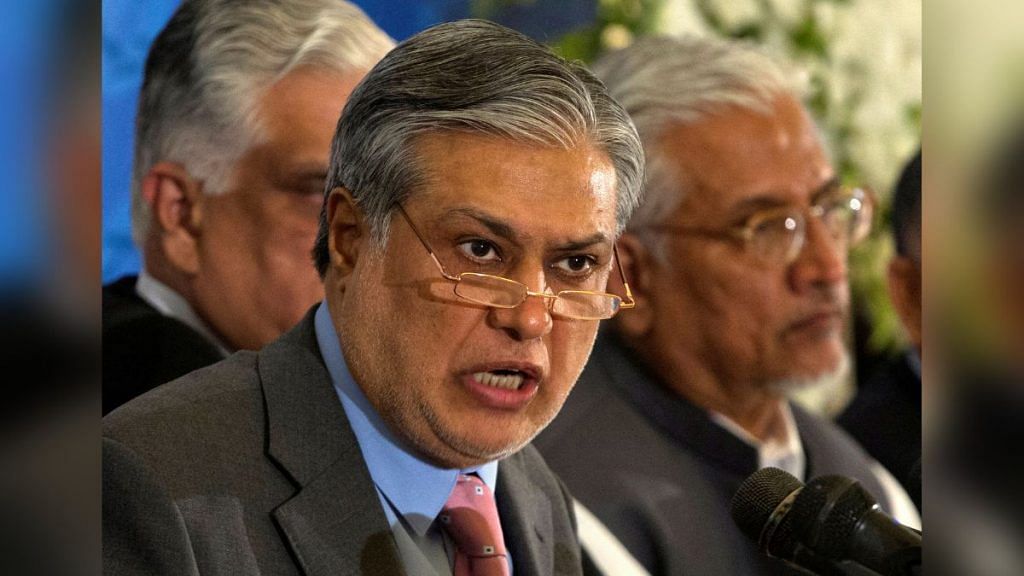New Delhi: The return of Ishaq Dar as Pakistan’s new finance minister has the country’s politicians and analysts abuzz. A Nawaz Sharif loyalist, Dar had spent the last five years in self-exile in the UK after being accused of corruption. His appointment on Wednesday raised a slew of questions with many convinced that he will take credit for the tough decisions made by his predecessor, Miftah Ismail.
“It was evident that a Karachi businessman with a doctorate in economics [Ismail] was there just as a stopgap arrangement for getting some hard tasks done,” said Pakistani author and journalist Zahid Hussain in an op-ed for Dawn: The mention of “Karachi businessman” is key, given Ismail was an outsider in a party with Punjabi or Lahore-based individuals at the helm.
After the previous Imran Khan-led PTI government violated the terms of Pakistan’s IMF bailout deal by announcing subsidies on petroleum products, Ismail began increasing fuel prices and eventually negotiated a tough deal with the Washington-based body. He secured a one-year extension on the bailout programme and the release $1.17 billion in funds to the flood-hit country.
“Dar’s work seems to have already been done for him. Miftah Ismail pulled through the hard part,” London-based political analyst Ayesha Siddiqa told ThePrint. “All Dar has to do now is stick to the IMF terms and other decisions that Ismail had made, closely watch over imports and refrain from giving out subsidies until the time is right.”
Dar, 72, took oath as finance minister for the fourth time on 28 September. He will steer Pakistan’s finances at a time when his country is struggling with an economic crisis worsened by deadly floods and is marked by high inflation, a falling rupee and low foreign exchange reserves.
Ahead of his swearing-in, the rupee began making gains and stocks responded positively.
Also read: Nothing secure about Pakistan’s cybersecurity. PMO leaks latest example
‘Party was divided on Miftah Ismail’
In 2017, Dar was indicted in a graft case linked to the Panama Papers scandal and later that year, was declared an absconder due to his repeated failure to appear before the court. But last week, an anti-graft court suspended warrants for Dar’s arrest, paving the way for his return.
On Tuesday, Ismail resigned as finance minister amid speculation that Nawaz Sharif and Dar had been unhappy with some of his key decisions, especially with regard to the hike in fuel prices.
Commenting on Ismail’s unceremonious exit, Pakistani business journalist Ariba Shahid said: “When Miftah decided to increase petrol prices, [PML-N Vice President] Maryam Nawaz consistently tweeted about her displeasure about this. It was clear from that point, that the party was divided on Miftah.”
“But it was only after he made those difficult decisions and negotiated a very tough deal with the IMF that he was discarded, only to have Dar now take credit for his work,” she added.
Also read: Pakistanis stand by minister Marriyum Aurangzeb after London hecklers call her ‘thief’
Controversial decisions
A recent Reuters report said that Dar comes with a “strong reputation” from previous stints as finance minister and is most famous for “strong-arming the central bank to liberally inject foreign exchange into the market to prop up the rupee”.
However, Hussain has pointed out that Dar’s efforts to control the exchange rate by pumping dollars into the market were in fact controversial and “also the reason for the country going back to the IMF for a bailout in 2019”.
According to Shahid, there are also questions on whether Dar will revert to a managed or controlled currency and undo all the economic reforms since 2018.
“In 2018, the rupee had depreciated about 17 per cent as the central bank let the market determine its rate. This was because it was widely overvalued, and was done with the support of the then government. If we go back to a managed or controlled currency, which Dar is likely to bring back once Pakistan gets adequate reserve inflows, we could see all the reforms and development since 2018 reversed,” said Shahid.
Siddiqa claims public opinion in Pakistan over Dar’s return (and its timing) is divided, especially given his closeness to the Sharif family with his eldest son the husband of Nawaz Sharif’s daughter.
“In the context of the civil-military divide debate, Dar has long created an impression that his refusal to allocate extra budget to the military made him unpopular which is a false narrative. The military never starved for funds under him nor is likely to do so now that he has returned. However, pushing financial limits would create problems for the state,” said Siddiqa.
